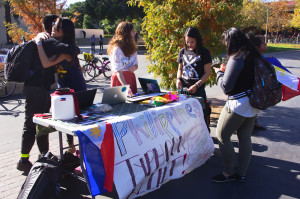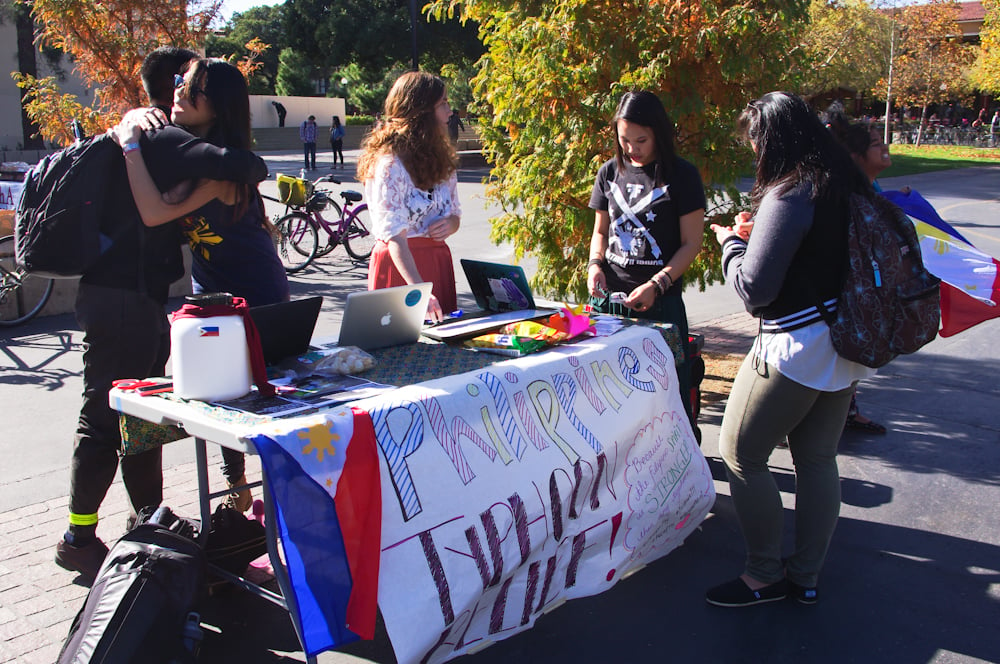Geraldine “Dindin” Baniqued ’14 was shocked when she heard that Typhoon Haiyan struck the Philippines, her home country, on Nov. 8.
The International Relief and Development nonprofit humanitarian group estimates over 10,000 dead and around 10 million affected by what is being called one of the most powerful storms in history.

Amid international and national relief efforts, the Stanford community and the city of Palo Alto are doing their part to help those in need.
For immediate relief, Stanford’s Pilipino American Student Union (PASU)—which Baniqued co-chairs—is directing the Stanford community to donate to the nonprofit National Alliance for Filipino Concerns (NAFCON).
Last week PASU held a three-day tabling event in White Plaza where they encouraged students to make online monetary donations to NAFCON.
At first PASU members collected cash donations, but upon realizing University policy that prohibits cash solicitations in White Plaza they subsequently resorted to sharing information on how to make online donations.
PASU co-chair Jomar Sevilla ’14 said that while the group ultimately did manage to get several students to donate online and continues to encourage students to digitally contribute to NAFCON, it was disappointing to have to turn away any cash donations after the first day of tabling.
“It was an obstacle and I think it kind of prevented us from really reaching as much funding as we could for White Plaza,” Sevilla said.
Beyond fundraising efforts, various groups and individuals eager to help spread the word of how to lend a hand overseas have also approached PASU.
The National Association for the Advancement of Colored People (NAACP) reached out to PASU to host a community gathering this past Monday consisting of an information session on Typhoon Haiyan’s impact, a reflection of the tragedy and a vigil for those affected.
Baniqued explained that the NAACP provided the space and logistical equipment and also helped with the setup and takedown of the event.
“We don’t do too many events with [the NAACP] and them reaching out to us just kind of showed us that this tragedy that happened in the Philippines was indeed something that united all the communities at Stanford,” Baniqued said.
Baniqued described other examples of community outreach, including staff members in the department of Electrical Engineering setting up a donation box for relief efforts and asking PASU to provide informational handouts on the storm’s impact, and the Graduate Student Council asking PASU to attend a Thanksgiving dinner to inform guests and collect donations.
PASU is also currently in the process of forming a task force dedicated to cultivating discussions on how local communities can best meet the on-going needs of those affected by the storm. Such needs include addressing socio-political issues in the Philippines.
While PASU is leading the charge, Baniqued and Sevilla explained how membership for the new task force is open to everyone on and off campus who is willing to help out.
Baniqued added that though the task force’s explicit goals are yet to be determined, one of the biggest things it will handle is to keep track of various fundraising and information events across communities.
Just next door to PASU’s on campus efforts, the Palo Alto City Council has agreed to donate $10,000 out of its contingency fund towards its Pilipino sister city Palo in Leyte Island that was hit by the typhoon, according to Claudia Keith, chief communications officer of Palo Alto.
Through coordination with the nonprofit Neighbors Abroad, Palo Alto has sister cities around the world, with Palo in the Philippines being the first. Ruth Carleton, Neighbors Abroad Vice President in charge of Palo, explained that the organization sponsors a children’s library in Palo and provides the salaries of two Pilipina librarians there.
As Neighbors Abroad continues to collect funds to send over to Palo, Carleton is worried about how little direct communication the organization has with the region and the sparse knowledge of the librarians’ whereabouts.
“We know nothing about what has happened with them, dear wonderful amazing ladies, and we don’t know if they’re okay,” Carleton said.
While Baniqued’s relatives are unaffected by the storm, she and Sevilla recognize the devastation survivors are facing and amidst the tragedy, they see an opportunity to more openly discuss how much of an impact PASU can have from the states.
“Often at Stanford all the different organizations and [Voluntary Student Organizations] live in their own bubble but we need to start looking out and seeing and know that these people are our people and that they’re also affected by this and that we should look out for them,” Sevilla said.
Be it through monetary donations to organizations like NAFCON and Neighbors Abroad or simply offering a prayer of Thanksgiving to the numerous victims and survivors, Sevilla said he is touched by how the local community has come together to attend to those in need.
“This is just the Stanford community, but if the Stanford community can bring this to all their outside community, I’m sure we are a really far reaching network,” Sevilla said.
Contact Ileana Najarro at inajarro ‘at’ stanford.edu.
